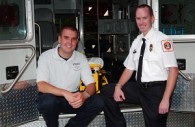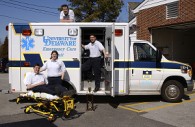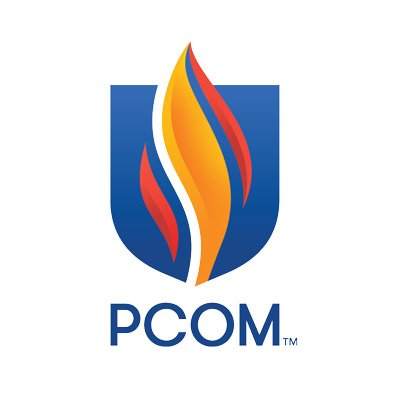UD Emergency Care Unit marks 30 years of service
Article by Jerry Rhodes
Photos by Tyler Jacobson and Kathy F. Atkinson
1:28 p.m., July 18, 2006--With about 20 volunteers and a borrowed 1970 Ford van for an ambulance, the University of Delaware Emergency Care Unit (UDECU) began operating on the school's Newark campus in the fall of 1976.
Three decades later, the student-run organization averages about 50 members a semester who help to provide emergency medical care to members of the University and surrounding communities.

Bart Nicholson (left), a senior computer engineering major and coordinator for UDECU, says he got involved with the unit while looking for something to do as a sophomore. Chris Johnson (right), who graduated from UD in 2000 after serving on UDECU
The UDECU, which includes an ambulance and bike team, responds to a wide range of 911 emergencies and provides coverage at UD sporting events, Commencement ceremonies and concerts. UDECU provides 24/7 ambulance coverage during the school year, and each member is trained in CPR and as a nationally registered EMT (emergency medical technician).
The group also has provided standby coverage for popular off-campus events, including the NASCAR races held each spring and fall at Dover International Speedway.
The student-run emergency care unit began when Kevin O'Neill, who graduated in 1979 with a bachelor's degree in psychology, became concerned about the emergency care his roommate received after suffering an epileptic seizure.
“Prior to attending UD in the fall of 1975, I had become an EMT, working as a high school student with the New Castle County emergency medical service (EMS) and paramedic program. In my first semester at UD, my roommate had a seizure, and I was concerned about the emergency care he received,” O'Neill said. “I had visited DePauw University, in Indiana, where I saw a student-run ambulance unit that served the campus and the [Putman] county. I decided to approach the UD administration to form a similar student-run EMS service based at UD.”
The UDECU got the green light from the UD administration and held its first meeting on May 13, 1976, in the Perkins Student Center, O'Neill said.
“We attracted over a dozen qualified students, and we started immediately with an old ambulance we got from UD security,” O'Neill said. “Jack Lynn, an investigator in UD's Department of Public Safety, became our adviser. He is still the group's adviser 30 years later.”
Support in the early years came from many people, including then-UD President E. Arthur Trabant, O'Neill said.
“It was a pleasant surprise of public gratitude when President Trabant showed up at one of our early UDECU graduations,” O”Neill said. “That was very nice of him.”
Although he lost touch with the UDECU when his career in cancer pharmaceuticals unfolded in the 1980s, O'Neill said that when he reconnected in the 1990s, he saw that the organization was still committed to delivering the best possible care to the communities it serves.
“It remains a point of excellence that UDECU rarely misses initiating a call response within six minutes, often getting there in much less time,” O'Neill said. “UD has been recognized repeatedly at the very top of the national EMS level, and has a wall full of awards to prove it.”
Peer and professional recognition for UDECU includes a 2005 “Best Overall” from the National Collegiate Emergency Medical Services Foundation, a nonprofit professional organization that promotes the development of campus-based emergency response groups.
UDECU also was the first recipient of the Striving For Excellence Award in 2002. The award is given every three years to teams that meet national criteria for collegiate emergency medical services organizations. That same year UDECU became the first college group to win the Leo R. Schwartz Emergency Medical Service of the Year Award from the National Association of Emergency Medical Technicians.

In February 2005, UDECU won two awards, including “Best Overall,” from the National Collegiate Emergency Medical Services Foundation. The winning UDECU group that year included (from left) Harlan Westgate, a senior criminal justice major; Megan Lieblein, a junior honors nursing major; Steve Snow, a medical technology sophomore; and Ross Cohen, a senior history major.
Chris Johnson, who graduated in 2000 with a bachelor's degree in physical education studies (exercise physiology), said serving on UDECU's executive board for three of his four years as a member proved beneficial in preparing him for his current appointment as deputy chief of emergency medical services for the Aetna Hose, Hook and Ladder Co.
“Helping to successfully run a collegiate-based emergency medical service program brought unique challenges and management difficulties,” Johnson said. “I learned that the value of a volunteer emergency medical technician cannot be measured, and that such individuals are now few and far between.”
Recruiting and retaining of such individuals in a college EMS unit also brought its own specific set of challenges, Johnson said.
“Since UDECU is a campus-based EMS program, its turnover rate is exponentially high, due to students graduating every four years,” Johnson said. “The techniques I used to recruit, quickly train and place these personnel in unique emergency medical situations is one that I still use today at Aetna.”
The partnership between Aetna and UDECU is one of the fire company's greatest assets, Johnson said.
“Our two organizations have become sister departments in that we train together on a monthly basis, share EMS bike teams, help with stand-by events both on and off campus and work together on emergency incidents on an almost daily basis,” Johnson said. “As one of the top and most decorated campus EMS organizations, Aetna is proud to be affiliated with the officers and members of UDECU.”
Johnson said that his experience with the UDECU also led to his present career position.
“When I graduated from UD in May 2000, I started in the Delaware Technical and Community College paramedic program the very next week,” Johnson said. “Two years later, I had completed their associate degree program in paramedic technology, and I am now employed as a paramedic first class with the New Castle County Department of Public Safety's Emergency Medical Service Division.”
Bart Nicholson, a senior computer engineering major and coordinator for UDECU, said he got involved with the unit while looking for something to do as a sophomore.
“It's a pretty big commitment, but it also is very rewarding,” Nicholson said. “We are a close knit group, and it's a lot of fun.”
Nicholson said that UDECU members see a lot of different situations in fulfilling the organization's role as a county ambulance service and a unit of second call for the city of Newark.
“We see anything and everything,” Nicholson said. “There is everything from sick people to car accidents and cardiac arrest situations.”
It was especially rewarding, he said, to meet present and past members of UDECU during its 30th anniversary celebration held in Clayton Hall during spring semester.
“The alumni talked about how their friendships have lasted, and how they still get together,” Nicholson said. “It's a great thing being part of UDECU. You learn professional skills, and you learn how to deal with people. You get to help people, and it's also a lot of fun.”

